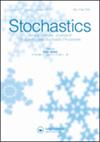成对NQD随机变量的完全矩收敛性
IF 0.9
4区 数学
Q3 MATHEMATICS, APPLIED
Stochastics-An International Journal of Probability and Stochastic Processes
Pub Date : 2015-03-04
DOI:10.1080/17442508.2014.939975
引用次数: 17
摘要
已知两两负象限相关随机变量(NQD)的依赖结构弱于负相关随机变量和负正交相关随机变量。本文研究了基于成对NQD随机变量的移动平均过程。给出了该移动平均过程的完全矩收敛性和最优点的可积性。结果表明,对NQD序列具有完全收敛性和marcinkiewicz - zygmund型强大数定律。本文章由计算机程序翻译,如有差异,请以英文原文为准。
Complete moment convergence of pairwise NQD random variables
It is known that the dependence structure of pairwise negative quadrant dependent (NQD) random variables is weaker than those of negatively associated random variables and negatively orthant dependent random variables. In this article, we investigate the moving average process which is based on the pairwise NQD random variables. The complete moment convergence and the integrability of the supremum are presented for this moving average process. The results imply complete convergence and the Marcinkiewicz–Zygmund-type strong law of large numbers for pairwise NQD sequences.
求助全文
通过发布文献求助,成功后即可免费获取论文全文。
去求助
来源期刊

Stochastics-An International Journal of Probability and Stochastic Processes
MATHEMATICS, APPLIED-STATISTICS & PROBABILITY
CiteScore
1.90
自引率
0.00%
发文量
42
审稿时长
>12 weeks
期刊介绍:
Stochastics: An International Journal of Probability and Stochastic Processes is a world-leading journal publishing research concerned with stochastic processes and their applications in the modelling, analysis and optimization of stochastic systems, i.e. processes characterized both by temporal or spatial evolution and by the presence of random effects.
Articles are published dealing with all aspects of stochastic systems analysis, characterization problems, stochastic modelling and identification, optimization, filtering and control and with related questions in the theory of stochastic processes. The journal also solicits papers dealing with significant applications of stochastic process theory to problems in engineering systems, the physical and life sciences, economics and other areas. Proposals for special issues in cutting-edge areas are welcome and should be directed to the Editor-in-Chief who will review accordingly.
In recent years there has been a growing interaction between current research in probability theory and problems in stochastic systems. The objective of Stochastics is to encourage this trend, promoting an awareness of the latest theoretical developments on the one hand and of mathematical problems arising in applications on the other.
 求助内容:
求助内容: 应助结果提醒方式:
应助结果提醒方式:


